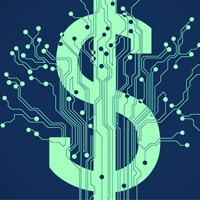
Banks Consider the Rewards and Risks of Big Data
The retail banking industry is a veritable goldmine of consumer behavior data. While data is proliferating in every direction, the build-up of data about individual’s financial-related activities is viewed as a particularly lucrative source of actionable information. However, some banks are hesitant to begin using the data because of ethical concerns.
 There are many possible uses of big data in the consumer banking industry. The more forward-looking banks are currently using it to build loyalty, cross-sell services, detect fraud, and manage risk.
There are many possible uses of big data in the consumer banking industry. The more forward-looking banks are currently using it to build loyalty, cross-sell services, detect fraud, and manage risk.
For example, one bank in the UK is analyzing its customers’ utility bills to see how much they spend, according to a recent story in the South African business publication Financial Mail. If it detects that a customer is paying more than their peers, it may offer to switch the customer to another utility at a lower rate.
Other banks look for signs that a customer has been given a raise or a bonus, which can trigger the automatic generation of investment offers. “You see this trend of leveraging big data to get much more personal financial management,” Simon Paris, global head of financial services at SAP, told FM.
An excellent use of big data is fraud detection. According to the Association of British Insurers, only 30 percent of fraud is detected, FM says. Banks and software companies are continually working to improve algorithms that can automatically detect fraud, with the hope of making a dent in the 70 percent of fraud that is never detected.
Some banks have taken the big data trend further–even to the point of monitoring social media websites and Twitter feeds. If they detect that an individual is unhappy with their current bank, they jump in and make the customer an offer to switch banks, with the hopes of stealing a customer from the competition.
This practice pushes the ethical boundaries of what can and should be done with customer’s data. It does not appear to be widespread, and few banks, if any, will talk about it, the FM says, but it does occur.
Other banks are hesitant to really explore the value of their data, for fear of violating their customers’ privacy and their trust. This is particularly evident when one considers uproar over the secret telephone and email surveillance programs of the U.S. Government that were recently made public by former NSA worker Edward Snowden.
The potential upside to banks is too great to ignore, however. “After all, who has more information about you than your primary bank?” Falk Rieker, global industry business unit head of banking at SAP, told FM.
Related Items:
Rethinking Loyalty Programs with a Big Data Brain
Financial Services Firm Look to Big Data for Compliance Solutions
Big Data Garbage In, Even Bigger Garbage Out






























